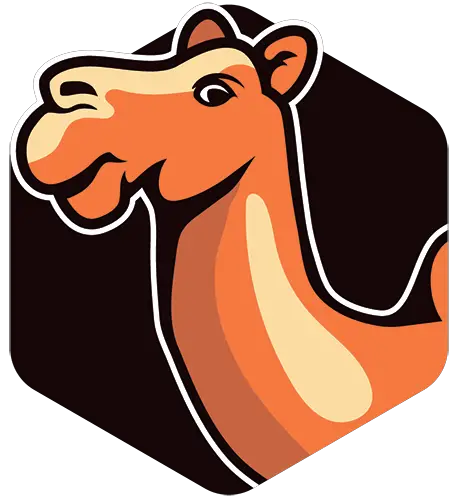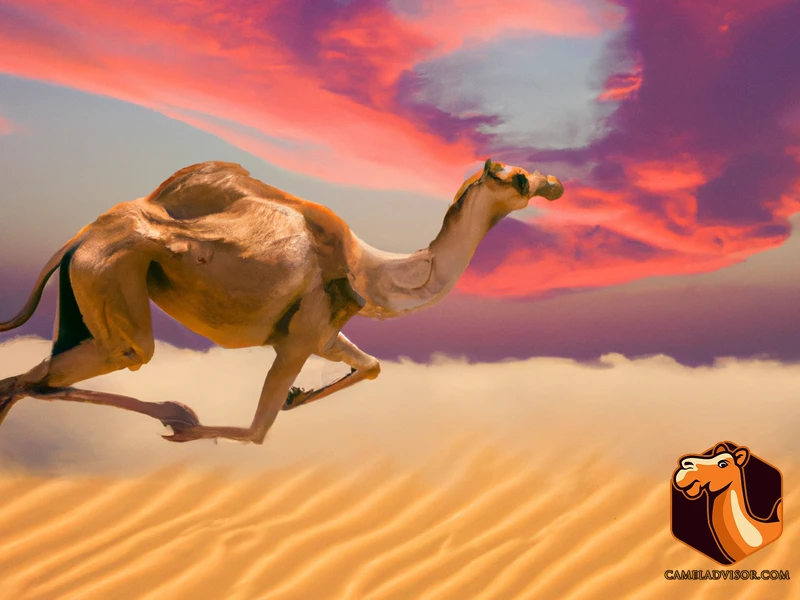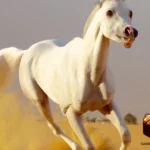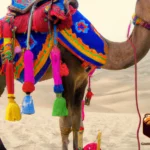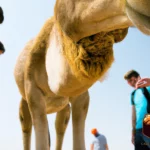As the popularity of camel racing continues to grow, many owners and trainers are left wondering about the best way to maximize their racing camel’s performance. Nutrition plays a crucial role in the health and performance of racing camels, but the specific requirements can be perplexing. Understanding the basics of camel nutrition, feeding and watering practices, and supplements and additives is essential for ensuring that racing camels are receiving the proper sustenance. In this article, we will explore the various aspects of maximizing racing camel performance through proper nutritional requirements and feeding practices.
Contents
Camel Nutrition Basics
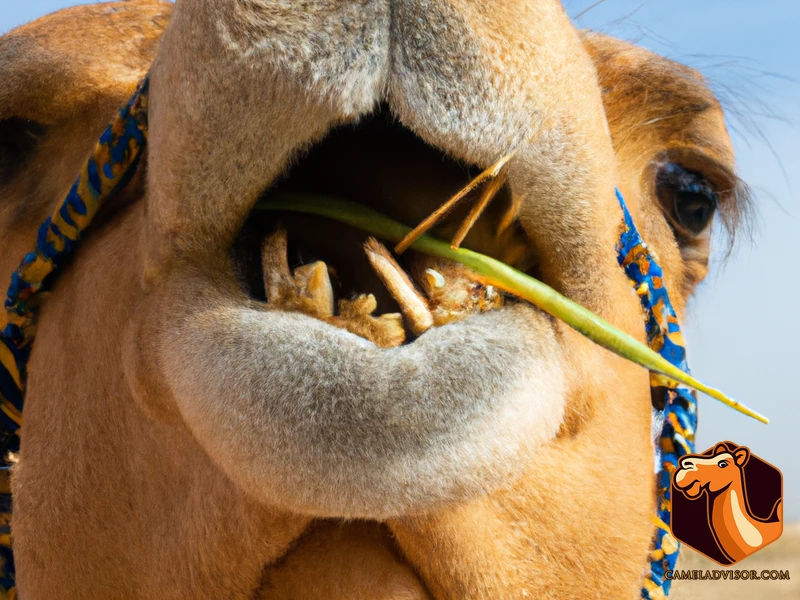
The nutritional requirements of racing camels are crucial for optimal performance in the arduous races they participate in. To understand how best to feed racing camels, it is important to have a basic understanding of their physiology and digestive system. Proper nutrition, feeding practices, and supplements are all essential components of maximizing racing camel performance. In this section, we will discuss the basics of camel nutrition and provide insights on feed composition, feeding and watering practices, as well as supplements and additives. By understanding these principles, trainers and owners can develop a comprehensive nutrition plan to support their camels in achieving top performance and endurance during races. To learn more about training racing camels, check out our article on racing camel training.
Camel Physiology
Camels, especially racing camels, have evolved to live in harsh environments, and their physiology has adapted accordingly to maximize their chances of survival. The camel’s body temperature can fluctuate without any adverse effects, which enhances its ability to cope with extreme weather conditions. Camels can also survive in areas with limited water and food, which is due to their ability to store fat in their humps, which they can convert into energy when food is scarce.
The digestive system of camels is unique and has evolved to allow them to extract as much nutrition as possible from tough vegetation in their natural environments. The rumen, the largest compartment of the camel’s stomach, contains bacteria and protozoa that break down plant fibers, and the microbial fermentation process produces volatile fatty acids that the camel can absorb through its stomach lining. The small intestine is short relative to other ruminants, which allows for rapid digestion and absorption of nutrients, while the large intestine is lengthened to maximize water absorption from feces.
As a herbivorous animal, camels require a diet rich in carbohydrates, fiber, protein, minerals, and vitamins for their growth, reproduction, and maintenance of health. They usually feed on roughage, such as grass and leaves, and their diet can vary depending on the region where they live.
The muscular and skeletal systems of camels are adapted to enable them to carry heavy loads and participate in long-distance races. The camel’s long legs enable it to take long strides while maintaining balance, while its broad feet provide stability and prevent it from sinking into sand or other soft terrain.
Understanding the physiology of camels is crucial for their care and feeding as well as for their training and racing. It is essential to provide them with a balanced diet that meets their nutritional requirements, ensuring their optimal health, and performance. Other aspects like physical and mental training are equally important for racing camels – best racing camels training, racing-camel endurance training, importance of physical training in racing camels, camel race mental preparation, and racing camel training tips are some of the significant factors that determine the success of racing camels.
Digestive System
The digestive system of racing camels is a complex system that allows them to efficiently break down and extract nutrients from their food. Understanding the different components of the digestive system will help maximize the nutritional benefits of different feed compositions.
Function
The teeth of camels are adapted to grinding rough vegetation and plants.
The salivary glands produce saliva that moistens the feed and contains enzymes that begin the breakdown of carbohydrates.
The esophagus is a muscular tube that transports the feed to the stomach.
The stomach of a camel is divided into three sections: the rumen, reticulum, and omasum. These sections break down and ferment the feed, allowing for the extraction of nutrients.
The small intestine is responsible for the absorption of nutrients from the broken-down feed.
The liver produces bile, which aids in the breakdown of fats.
The pancreas produces enzymes that aid in the breakdown of proteins and carbohydrates.
The cecum and large intestine are responsible for the fermentation of fiber and absorption of remaining nutrients and water.
Understanding the different parts of the digestive system can help in selecting feed compositions that will be broken down and utilized efficiently by racing camels. It is important to ensure that the feed is not too high in fiber, which can cause bloating and slow digestion. By selecting the right feed and managing it correctly, racing camels can maximize performance and maintain consistent energy levels throughout races.
Nutritional Requirements
Camels are hardy animals that can survive in harsh desert environments with minimal food and water. However, when it comes to racing camels, proper nutrition is essential for maximizing their performance. Racing camels have specific nutritional requirements that need to be met in order to maintain their health and performance. Here are some key nutritional requirements for racing camels:
| Nutrient | Requirement | Description |
|---|---|---|
| Water | 10-20 liters per day | Camels need a large amount of water to stay hydrated, especially during races. |
| Energy | Low to moderate | Camels need a balanced diet that provides enough energy for racing, but doesn’t lead to excessive weight gain. |
| Protein | 12-16% | Protein is important for muscle growth and repair, which is essential for racing camels. |
| Fat | 2-5% | Fat provides a source of energy for camels, but too much fat can lead to weight gain, which can negatively impact performance. |
| Vitamins | Varies | Vitamins, such as vitamin A, D, E and B-group vitamins, are important for maintaining good health and performance. |
| Minerals | Varies | Minerals like calcium, phosphorus, potassium, and sodium are essential for bone growth, muscle function, and electrolyte balance. |
Nutritional requirements may vary based on several factors, such as age, gender, body weight, and activity level. It is important to consult with a veterinarian or an animal nutritionist to develop a personalized diet plan for racing camels.
Feed Composition
Camels are unique animals and have specific dietary needs. The feed composition for racing camels must be carefully planned and monitored to ensure optimal performance. The type and amount of feed provided will depend on a variety of factors, including the age and weight of the camel, as well as the level and intensity of physical activity.
Forage is an essential component of a racing camel’s diet. It provides the necessary fiber for proper digestion and helps maintain a healthy gut microbiome. Forage sources can include hay, silage, and fresh pasture, with hay being the most commonly used.
Concentrates are also a crucial component of a racing camel’s diet. These are high-energy feeds that provide carbohydrates, protein, vitamins, and minerals. The most commonly used concentrates are grains such as barley, corn, and oats. Supplemental protein sources such as soybean meal or linseed meal can also be added.
Vitamins and Minerals are important components of a racing camel’s diet. They can be provided through supplements or specialized feeds. Camel-specific vitamin and mineral supplements are available and should be chosen based on the needs of the specific camel.
Water is the most essential nutrient for racing camels. They require substantial amounts of water to maintain proper bodily functions and prevent dehydration. Clean, fresh water should be available at all times, and water intake should be monitored to ensure adequate hydration.
It is crucial to note that racing camels’ feed composition must be balanced and meet their specific nutritional requirements. Additionally, any changes to their diet should be made gradually to prevent digestive issues. Working with a professional nutritionist can help ensure that the racing camels receive optimal nutrition for peak performance.
| Nutrient | Forage Sources | Concentrate Sources |
|---|---|---|
| Fiber | Hay, Silage, Fresh Pasture | N/A |
| Carbohydrates | N/A | Barley, Corn, Oats |
| Protein | N/A | Soybean Meal, Linseed Meal |
| Vitamins and Minerals | Specialized Feeds or Supplements | Specialized Feeds or Supplements |
The feed composition for racing camels must be carefully planned and balanced to meet their specific nutritional requirements. Forage provides essential fiber, while concentrates offer energy and protein. Vitamins and minerals should be added through supplements or specialized feeds, and adequate water intake is crucial. Working with a professional nutritionist can help ensure that the racing camels receive the optimal diet for peak performance.
Feeding and Watering Practices
When it comes to maximizing the performance of racing camels, paying close attention to their feeding and watering practices is crucial. Proper nutrition and hydration are key factors in ensuring that these animals can perform to the best of their abilities. However, determining the best feeding and watering practices can be a perplexing task for many camel owners, given the unique physiology and digestive system of these animals. In this section, we will delve deeper into the most effective feeding and watering practices for racing camels, highlighting the key considerations that must be taken into account.
Feeding Practices
When it comes to feeding racing camels, there are several practices that should be taken into consideration. Here are some feeding practices that can help maximize the performance of your racing camel:
- Provide high-quality forage: Camels are capable of consuming a wide variety of forages, but it is important to provide them with high-quality forage that is free from mold and other contaminants. Good quality hay or pasture can be a good source of forage for racing camels.
- Feed a balanced diet: Camels require a well-balanced diet that meets their nutritional requirements. A balanced diet should contain adequate amounts of protein, fat, fiber, vitamins, and minerals.
- Limit concentrates: Concentrates such as grains or pelleted feeds can be used to supplement the diet of racing camels, but they should be used sparingly. Overfeeding concentrates can lead to digestive problems and other health issues.
- Feed small, frequent meals: Camels have a unique digestive system that is adapted to grazing on small amounts of food throughout the day. Feeding small, frequent meals can help promote better digestion and avoid digestive upsets.
- Feed before exercise: It is important to provide the camel with a small meal before exercise to ensure that they have enough energy to perform. Feeding too much before exercise can lead to digestive upset, so it is important to provide a small amount of feed that is high in energy.
- Feed after exercise: After exercise, camels should be allowed to rest for a short period and provided with water. Once they have recovered, they can be given a small meal to help replace energy stores that were depleted during exercise.
By following these feeding practices, you can help ensure that your racing camel receives the nutrition it needs to perform at its best.
Watering Practices
Watering practices are essential to ensuring optimal performance in racing camels. These animals require a significant amount of water to function efficiently. Providing clean, fresh water at all times is crucial for keeping racing camels hydrated and healthy.
Water consumption:
A racing camel can consume up to 100 liters of water each day. This amount may increase on race days due to elevated ambient temperatures and increased activity levels. It is essential to provide fresh water at all times and to ensure that the water is clean and free of contaminants.
Water temperature:
The temperature of the water can affect a camel’s willingness to drink. Racing camels typically prefer water that is between 45°F (7.2°C) and 68°F (20°C). However, water that is too cold or too hot can discourage a racing camel from drinking, which may result in dehydration.
Water quality:
The quality of the water is also important to a racing camel’s overall health and performance. It is recommended to provide clean, fresh water from a reliable source. Water that is contaminated with heavy metals or pathogens can negatively affect a camel’s digestive system, leading to illness and decreased performance.
Watering frequency:
To ensure adequate hydration, racing camels should have access to water at all times. It is recommended to provide water frequently in small quantities rather than one large quantity at one time. This reduces the likelihood of over-drinking and prevents dehydration, especially during race days under hot weather conditions.
Hydration monitoring:
Monitoring a camel’s hydration status is crucial, and sufficient water must be given to ensure a camel is fully hydrated before and during races. Keep track of drinking behaviors and urine output, as this is an excellent indicator of hydration status. Additionally, monitoring weight before and after a race can help determine if a camel is adequately hydrated before and during the race.
Proper watering practices are essential in maximizing racing camel performance. Providing ample amounts of clean, fresh water at the appropriate temperature, quality, and frequency, and monitoring the camel’s hydration status can help maximize performance and ensure that the camel remains healthy and hydrated.
Supplements and Additives
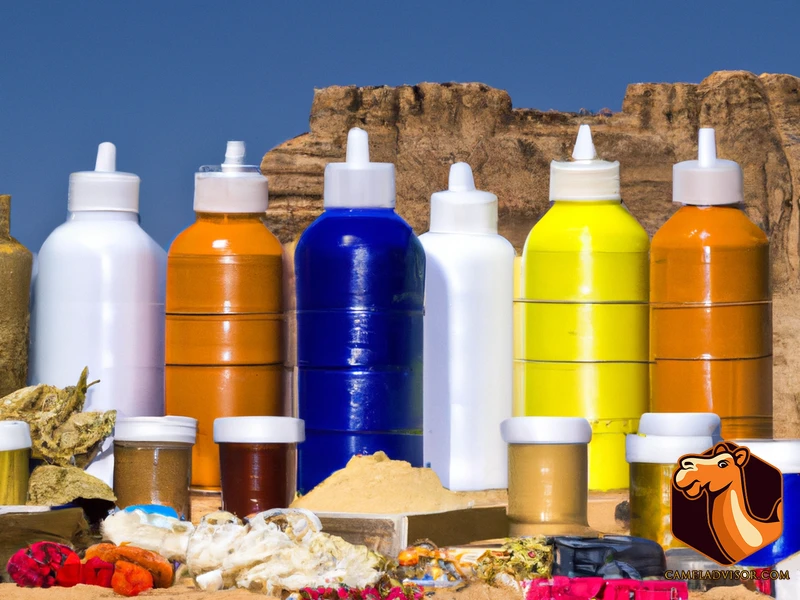
As racing camels require high levels of energy and endurance to perform at their best, their nutritional needs can be quite specific. Beyond basic feed and water, supplements and additives can play a crucial role in enhancing their performance. Whether it’s providing additional nutrients or improving digestion, there are a variety of options available. Here, we’ll explore the benefits of various supplements and additives that can help maximize your racing camel’s potential.
Supplements for Racing Camels
Supplements are a key factor in ensuring that racing camels meet their nutritional requirements. Here is a breakdown of various supplements that can be given to racing camels:
| Supplement | Function | Recommended Dosage |
|---|---|---|
| Vitamin E and Selenium | Antioxidant, helps improve muscle function and has anti-inflammatory properties. | 200-400 IU of Vitamin E and 0.1-0.3 mg of Selenium per day. |
| Brewer’s yeast | Provides B vitamins, enzymes, and amino acids. | 1-2 tablespoons per day. |
| Omega-3 fatty acids | Anti-inflammatory, improves immune function and supports cardiovascular health. | 1-2 tablespoons of flaxseed oil or fish oil per day. |
| Probiotics | Encourages healthy gut bacteria and aids in digestion. | 2-3 tablespoons of probiotics (such as yogurt or kefir) per day. |
| Electrolytes | Replace nutrients lost through sweat and increase hydration. | 1-2 tablespoons of electrolyte solution (such as salt and sugar in water) per day. |
| Joint supplements | Supports joint health and reduces inflammation. | Varies based on supplement; usually 1-2 tablespoons per day. |
It’s important to note, however, that supplements should not be relied upon as the sole source of essential nutrients. A balanced diet with proper feed composition should always be the foundation of a racing camel’s nutrition. It’s best to consult with a veterinarian or animal nutritionist to determine the most appropriate supplement regimen for each individual racing camel.
Additives for Racing Camels
In addition to supplements, racing camels may also benefit from the use of additives that enhance their performance. These additives are typically added to the camel’s feed or water and can provide a variety of benefits such as increased energy, improved digestion, and enhanced immune function. Here are some common additives used for racing camels:
| Additive | Function |
|---|---|
| Electrolytes | As camels sweat during races, they lose important electrolytes such as sodium, potassium, and magnesium. Adding electrolytes to their water or feed can help maintain proper hydration levels and prevent cramping. |
| Probiotics | Probiotics are live microorganisms that can improve gut health in camels. By supporting healthy digestion and boosting the immune system, probiotics can help prevent digestive upset and infection. |
| Prebiotics | Prebiotics are non-digestible fibers that feed the beneficial bacteria in a camel’s gut. By promoting the growth of healthy bacteria, prebiotics can improve digestion and immune function. |
| Enzymes | Enzymes are complex proteins that help break down food in the digestive system. Adding enzymes to a camel’s feed can improve the breakdown and absorption of nutrients, leading to better overall health and performance. |
| Amino Acids | Amino acids are the building blocks of proteins and are essential for muscle growth and repair. Supplementing with amino acids can enhance muscle development and recovery in racing camels. |
| Fatty Acids | Fatty acids are essential nutrients that play a variety of roles in the body such as regulating inflammation and supporting brain health. Adding fatty acids to a camel’s diet can improve their overall health and cognitive function. |
It’s important to note that the use of additives should be carefully monitored and the advice of a veterinarian or equine nutritionist should be sought. Overuse or misuse of additives can lead to negative health effects and should be approached with caution.
Training and Racing Nutrition
When it comes to maximizing the performance of racing camels, nutrition plays a vital role. A well-planned diet can help maintain the health and energy of the camel, ultimately affecting its performance on the track. The right nutrition during the training and racing phases is crucial for achieving success. In this section, we will explore the various aspects of nutrition that are important to consider during training and racing, including pre-race, during the race, and post-race nutrition. Let’s dive into the details of the training and racing nutrition for racing camels.
Pre-Race Nutrition
Prior to a race, it is essential to provide racing camels with proper nutrition to ensure they perform at their best. Here are some pre-race nutritional requirements that must be met:
- Carbohydrates: Carbohydrates provide energy to the camel’s body. Provide the camels with high-energy ingredients like oats, barley, and corn a day before the race to ensure they have enough energy during the race.
- Protein: Proteins help repair and grow the camels’ muscles. Include protein-rich feeds like alfalfa hay, cottonseed meal, and soybean meal in their diet a week prior to the race.
- Fats: Fat helps provide long-term energy to the camel’s body. Add vegetable oils like corn or canola and animal-based fats like animal tallow or lard to their diet two weeks before the race.
- Water: Hydration is crucial in maintaining a camel’s stamina and endurance during a race. Camels should be provided with enough water throughout the day, especially two days before the race.
- Vitamins and minerals: Vitamins and minerals play a vital role in the camel’s overall health and performance. Supplementing their diet with vitamins and minerals can strengthen their bones, muscles, and immune system.
It is important to note that overfeeding camels can lead to digestive problems and can affect their performance. It is recommended to consult with a veterinarian or a nutritionist to create a well-balanced and tailored diet plan specific for racing camels.
During the Race Nutrition
During the race, it is crucial to ensure that the racing camels receive adequate nutrition to maintain their performance levels. Here are some important tips to keep in mind for providing proper nutrition to racing camels during the race:
- Monitor water intake: Make sure that the camels are drinking enough water during the race to avoid dehydration. Encourage them to drink water at regular intervals, especially during breaks or rest periods.
- Electrolyte supplements: During long races or extreme heat, the camels may require electrolyte supplementation to maintain their body fluids and prevent dehydration. Consult with a veterinarian to determine the appropriate supplementation dosage and schedule.
- Provide easily digestible feeds: The food provided to racing camels during the race should be easily digestible to avoid gastrointestinal problems. This will also ensure that the camels receive a consistent flow of energy throughout the race.
- Include adequate amounts of carbohydrates: Carbohydrates are vital to maintaining energy levels during the race. Make sure the camels receive enough carbohydrates, such as grains or fruits, to keep their energy levels up.
- Avoid overfeeding: Overfeeding can lead to gastrointestinal problems and may negatively impact performance. It is essential to provide the camels with adequate nutrition without overfeeding them.
Proper nutrition during the race can significantly impact the performance of racing camels. By following these tips, you can help ensure that your camels are receiving the right nutrition to maintain their energy levels, avoid dehydration, and perform their best during the race.
Post-Race Nutrition
After the race, it is important to properly nourish the racing camel. Here are some post-race nutrition guidelines for racing camels:
- Hydration: Providing sufficient water to the camel post-race is critical. Dehydration can lead to shock, so sufficient water intake is a must. If the camel is not interested in drinking water, electrolyte solutions can be added to encourage drinking.
- Carbohydrates: After racing, it is important to refuel the glycogen stores of the camel by providing adequate amounts of carbohydrates. This can be done by feeding the camel energy-dense feeds like beet pulp, alfalfa hay or molasses.
- Protein: Post-race, muscle protein turnover increases, and it is important to provide adequate amounts of protein to maintain muscle mass. Good protein sources include alfalfa hay or pellets, soybean meal, or other high-quality protein supplements.
- Electrolytes: Dehydration leads to an imbalance of important minerals and electrolytes. Most high-performance camel feeds have added electrolytes to ensure proper balance post-race.
- Recovery Supplements: The use of supplements like glycine, arginine, or creatine can help enhance recovery and repair any damage caused by the race. These supplements can be added to the camel’s feed post-race.
- Rest and recovery: Allowing the camel time to rest and fully recover is essential. It is important to not overfeed the camel immediately post-race, as this can lead to digestive issues. Gradually increasing feed and water intake over several days after the race is recommended.
Following these post-race nutrition guidelines can help ensure the racing camel recovers appropriately and remains healthy for future competitions.
Conclusion
In conclusion, the nutritional requirements of racing camels are crucial for maximizing their performance. A well-rounded diet, proper feeding and watering practices, and supplements and additives can make a significant difference in a camel’s performance on the track.
Camel owners and trainers need to understand the unique physiology of camels, particularly their digestive system, to develop a proper feeding plan. A good feeding plan should take into consideration the type of feed and its composition, as well as the timing and frequency of feeding.
Watering practices are also an important consideration. Racing camels need access to clean water at all times, particularly in hot weather conditions. It is essential to provide a sufficient quantity of water and monitor the water quality regularly.
In addition to a healthy diet and good feeding and watering practices, supplements and additives can help improve racing camel performance. Supplements like mineral and vitamin mixes can boost a camel’s energy levels, while additives like electrolytes can help replace fluids lost during intense exercise.
When it comes to training and racing, there are specific nutrition requirements. Pre-race nutrition should focus on high-quality protein and slow-release carbohydrates, while during the race, camels need to consume electrolytes and fluids to maintain hydration levels. After the race, a balance of carbohydrates and protein can help replenish energy stores.
Overall,, it is essential to understand the nutritional needs of racing camels, provide them with a healthy diet, proper feeding and watering practices, and necessary supplements and additives to ensure maximum performance on the track.
Frequently Asked Questions
Question 1?
What is the daily feeding requirement for a racing camel?
Answer:
A racing camel requires about 5 to 7 kg of food per day.
Question 2?
What kind of lean protein should be included in the camel’s diet?
Answer:
The diet of a racing camel should include lean protein such as legumes, fish, and soy-based products.
Question 3?
What are some good sources of carbohydrates for racing camels?
Answer:
Oats, barley, corn, and alfalfa are some good sources of carbohydrates for racing camels.
Question 4?
How much water does a racing camel require per day?
Answer:
Racing camels require around 20 to 40 liters of water per day, depending on their workload and climate.
Question 5?
What are some signs of dehydration in racing camels?
Answer:
Signs of dehydration in racing camels include dry mouth, sunken eyes, lethargy, and reduced urine output.
Question 6?
Are there any supplements that can help improve racing camel performance?
Answer:
Yes, supplements such as vitamins, minerals, and electrolytes can help improve racing camel performance.
Question 7?
What are some additives that can be added to a racing camel’s diet?
Answer:
Additives such as probiotics, prebiotics, and enzymes can be added to a racing camel’s diet to improve digestion and overall health.
Question 8?
How should a racing camel’s nutrition be adjusted during training and racing season?
Answer:
During training and racing season, a racing camel’s diet should be adjusted to include more carbohydrates and water to meet their increased energy and hydration needs.
Question 9?
What should a racing camel eat before a race?
Answer:
A racing camel should eat a high-carbohydrate meal such as oats or barley several hours before a race to provide them with energy.
Question 10?
What should a racing camel eat after a race?
Answer:
After a race, a racing camel should be offered water and electrolytes to rehydrate, followed by a meal consisting of hay and grains to replenish energy stores.
